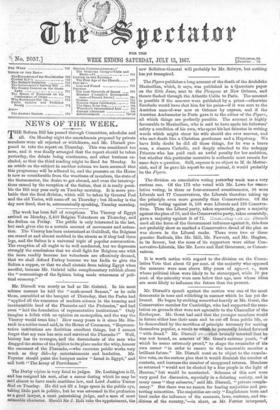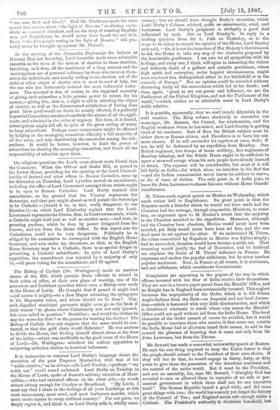Mr. Disraeli's speech against the motion was one of the
most democratic in tone and rollicking in manner which he has yet de- livered. He began by striking somewhat heavily at Mr. Gorst, the Conservative member for Cambridge, who had supported the reso- lution on grounds that were not agreeable to the Chancellor of the Exchequer. Mr. Gorst had said that the younger members would in future either lose their seats and be cut off from public life, or be demoralized by the sacrifices of principle necessary for making themselves popular, a result to whiala he personally looked forward " with dread." Mr. Disraeli sal.is what brutally retorted that he was not bound, on account of Mr. Gorst's extreme youth, "of which he seems extremely proud," to shape the remainder of his own career " in order to ensure to the honourable member a brilliant future." Mr. Disraeli went on to object to the cumula- tive vote, on the curious plea that it would diminish the number of contests, and increase the number of unopposed returns. Members so returned " would not be elected by a free people in the light of Heaven," but would be nominated. Schemes of this sort were very good for discussion, especially in a debating society, and in many cases " they subserve," said Mr. Disraeli, " private compla- cency." But there was no reason for fearing majorities and pro- tecting minorities. The majorities are only "Englishmen born and bred under the influence of the manners, laws, customs, and tra- ditions of the country,"—in short, as Mr. Forster interposed,































